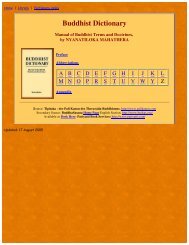The Three Basic Facts of Existence II: Suffering (Dukkha) - Buddhist ...
The Three Basic Facts of Existence II: Suffering (Dukkha) - Buddhist ...
The Three Basic Facts of Existence II: Suffering (Dukkha) - Buddhist ...
- No tags were found...
You also want an ePaper? Increase the reach of your titles
YUMPU automatically turns print PDFs into web optimized ePapers that Google loves.
V. <strong>Dukkha</strong>, a <strong>Basic</strong> Concept in Buddhism<strong>The</strong> term dukkha, derived from an adjective dukkha (Skr. dukkhā), analogically formed aftersukha, has the primary meaning <strong>of</strong> pain. All that is unpleasant, painful, resulting in misery, or inother words, what is opposed to sukha is denoted by the term dukkha, as may be seen from <strong>of</strong>trecurringphrases as dukkhadomanass’-upāyāsa (pain, sorrow and despair). In its primarymeaning (so also in the specialised technical usage in the Buddha’s Teachings, as may be notedlater), dukkha corresponds more to the physical aspect <strong>of</strong> pain though the mental aspect is alsoincluded, while domanassa expresses exclusively the mental. Physical ease is denoted by theterm sukha, both in general and specific connotations, while somanassa expresses the mentalattitude. It is dukkha that leads to domanassa; and soka “grief” is more or less synonymous withit, and the opposite holds good with sukha and somanassa. Apart from the specialised meaning inwhich the term is employed in <strong>Buddhist</strong> psychological ethics, the general meaning may be seenin simple descriptions such as sukha vedanā dukkhā vedanā adukkhamasukhā vedanā “pleasantsensations, unpleasant sensations and neither pleasant nor unpleasant sensations,” or even inthe description <strong>of</strong> one <strong>of</strong> the two extremes (antā) in the opening words <strong>of</strong> the Buddha’s firstdiscourse. In the Dhammacakkappavattana the Buddha speaks <strong>of</strong> the two extremes a recluseshould avoid (i) self-indulgence which is base, vulgar, pertaining to the common man, ignobleand serving no purpose, and (ii) self-mortification, which is painful (dukkha) ignoble and equallyserving no purpose. Everything associated with pain or unpleasantness entailing sorrow andhardship and involving any type <strong>of</strong> difficulty is described as dukkha, in the wider meaning <strong>of</strong>the term.Before coming to the special connotation <strong>of</strong> the term in the Buddha’s Teachings, a word<strong>of</strong> caution is necessary regarding the translation <strong>of</strong> the term. Whether we translate it as pain, orill or misery, we should bear in mind that it is used as a philosophical concept. Or else, wewould fall into the error <strong>of</strong> making all manner <strong>of</strong> vague generalisations about the Buddha’sTeachings which are far from what it is. One such instance is the allegation that Buddhism ispessimistic because it recognises the presence <strong>of</strong> dukkha. If the disciple remains inactive andresigns himself to his fate saying that he is overcome by dukkha, this allegation would bejustified. But he does not stop with it. He says: dukkh’otinno’ mhi dukkha-pareto, api nu imassakevalassa dukkhakkhandhassa antakiriyā paññāyetha—“I am steeped in ill, subject to ill, but perhapsthe destruction <strong>of</strong> this entire aggregate <strong>of</strong> ill will make itself manifest to me.” In the formulation<strong>of</strong> the Four Noble Truths the Buddha’s main concern is the elimination <strong>of</strong> dukkha—and thecessation and the path leading to the cessation <strong>of</strong> dukkha—are the most significant features. <strong>The</strong>discovery <strong>of</strong> dukkha would be <strong>of</strong> no significance if its elimination played no part in theTeachings. If dukkha has to be eliminated and if the Buddha has shown the path to do so, therecognition <strong>of</strong> the prevalence <strong>of</strong> dukkha in no way justifies the allegation <strong>of</strong> pessimism.Coming back to the term dukkha, as pointed out by Rhys Davids and Stede, 42 “there is noword in English covering the same ground as dukkha does in Pali. Our modern words are toospecialised, too limited, and usually too strong. Sukha and dukkha are ease and dis-ease (but weuse disease in another sense); or wealth and ilth from well and ill (but we have now lost ilth); orwell-being and ill-ness (but illness means something else in English). We are forced, therefore,in translation to use halt synonyms, no one <strong>of</strong> which is exact. <strong>Dukkha</strong> is equally mental andphysical. Pain too is predominantly physical, sorrow too exclusively mental, but in someconnections they have to be used in default <strong>of</strong> any more exact rendering. Discomfort, suffering,ill and trouble can occasionally be used in certain connections. Misery, distress, agony, affliction42P.T.S. Dictionary, s. v.19
















